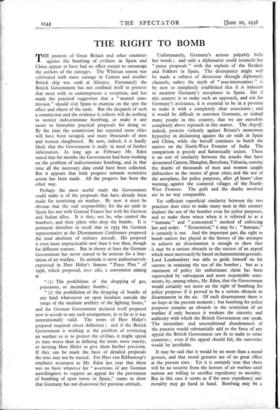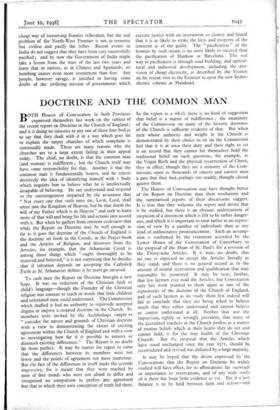THE RIGHT TO BOMB
THE protests of Great Britain and other countries against the bombing of civilians in Spain and China appear to have had no effect except to encourage the authors of the outrages. The Whitsun season was celebrated with more carnage in Canton and another British ship was sunk at Alicante. Fortunately the British Government has not confined itself to protests that meet with so contemptuous a reception, and has made the practical suggestion that a " neutral com- mission " should visit Spain to examine on the spot the effect and object of the raids. But the despatch of such a commission and the evidence it collects will do nothing to restrict indiscriminate bombing, or make it any easier to formulate practical proposals for doing so.
By the time the commission has reported more cities will have been ravaged, and more thousands of men and women slaughtered. By now, indeed, it is hardly likely that the Government is really in need of further information. As long ago as February Mr. Eden stated that for months the Government had been working on the problem of indiscriminate bombing, and in that time all the necessary data could have been collected. But it appears that little progress towards restrictive action has been made. All the progress has been the other way.
Perhaps the most useful study the Government could make is of the proposals that have already been made for restricting air warfare. By now it must be obvious that the real responsibility for the air raids in Spain lies not with General Franco but with his German and Italian allies. It is they, not he, who control the bombers, and their pilots who drop the bombs. It is pertinent therefore to recall that in 1933 the German representative at the Disarmament Conference proposed the total abolition of military aircraft. His proposal is even more impracticable now than it was then, though for different reasons. But in theory at least the German Government has never ceased to be anxious for a limi- tation of air warfare. Its attitude is most authoritatively expressed in Herr Hitler's famous " Peace Plan " of 1936, which proposed, inter alia, a convention aiming at " (I) The prohibition of the dropping of gas, poisonous, or incendiary bombs ; " (2) the prohibition of the dropping of bombs of any kind whatsoever on open localities outside the range of the medium artillery of the fighting fronts," and the German Government declared itself prepared now to accede to any such arrangement, in so far as it was internationally valid. The terms of Herr Hitler's proposal required closer definition ; and if the British Government is working at the problem of restricting air warfare so as to protect the civilian, it might spend its time worse than in defining the terms more exactly, or inviting Herr Hitler to give them further precision. If they can be made the basis of detailed proposals the time may not be wasted. For Herr von Ribbentrop's emphatic assurance to Mr. Eden last year that there was no basis whatever for " assertions of any German unwillingness to support an appeal for the prevention of bombing of open towns in Spain," seems to show that Germany has not disavowed her previous attitude. Unfortunately, Germany's actions palpably belie her words ; and only a diplomatist could reconcile her " peace proposals " with the exploits of the Henkels and Fokkers in Spain. The discrepancy might well be made a subject of discussion through diplomatic channels, unless the myth of " non-intervention " is by now so completely established that it is indecent to mention Germany's aeroplanes in Spain. But if this country is to make such an approach, and ask for Germany's assistance, it is essential to be in a position to make it with a completely clear conscience ; and it would be difficult to convince Germany, or indeqd many people in this country, that we are oursebies completely above reproach in this matter. The Angrilf, indeed, protests violently against Britain's monstrous hypocrisy in declaiming against the air raids in Spain and China, while she herself continues to bomb the natives on the North-West Frontier of India. The comparison is grossly and fantastically unjust. There is no sort of similarity between the attacks that have devastated Canton, Shanghai, Barcelona, Valencia, causinz the deaths of thousands of men and women caught defenceless in the streets of great cities, and the use of the aeroplane, for police purposes, after 48 hours' clear warning, against the scattered villages of the North- West Frontier. The guilt and the deaths involved are in no way comparable.
Yet sufficient superficial similarity between the two practices does exist to make many men in this country deplore the use of the bomber even for police purposes, and to make them wince when it is referred to as a " humane " and " economical " method of enforcing law and order. " Economical," it may be ; " humane," it certainly is not. And the important part the right to bomb natives has played in the history of the attempts to achieve air disarmament is enough to show that it may be a serious obstacle to the success of an appeal which must necessarily be based on humanitarian grounds. Lord Londonderry was able to pride himself on his success in retaining the use of the bomber ; but as a statement of policy his unfortunate claim has been superseded by subsequent and more responsible state- ments, by, among others, Mr. Eden, that the Government would certainly not insist on the right of bombing for police purposes if it proved to be a serious obstacle to disarmament in the air. Of such disarmament there is no hope at the present moment ; but bombing for police purposes remains an obstacle to the restriction of air warfare if only because it weakens the sincerity and authority with which the British Government can speak. The immediate and unconditional abandonment of the practice would substantially add to the force of any appeal the British Government saw fit to make to other countries ; even if the appeal should fail, the surrender would be justifiable.
It may be said that it would be no more than a moral gesture, and that moral gestures are of no great effect at the present time. Yet it is certainly true that there will be no security from the horrors of air warfare until nations are willing to sacrifice expediency to morality. But in this case it seems as if for once expediency and morality may go hand in hand. Bombing may, be a cheap way of terrorising frontier tribesmen, but the real problem of the North-West Frontier is not to terrorise but civilise and pacify the tribes. Recent events in India do not suggest that they have been very successfully pacified ; and by now the Government of India might take a lesson from the wars of the last two years and learn that in natives, as in Chinese and Spaniards, air bombing causes even more resentment than fear. Any people, however savage, is justified in having some doubt of the civilising mission of governments which execute justice with an instrument so clumsy and brutal that it is as likely to strike the lives and property of the innocent as of the guilty. The " pacification " of the frontier by such means is no more likely to succeed than the pacification of Hankow or Barcelona. The real way to pacification is through road building, and agricul- tural and industrial development, including the pro- vision of cheap electricity, as described by the Viceroy on his recent visit to the Frontier to open the new hydro- electric scheme at Malakand.











































 Previous page
Previous page